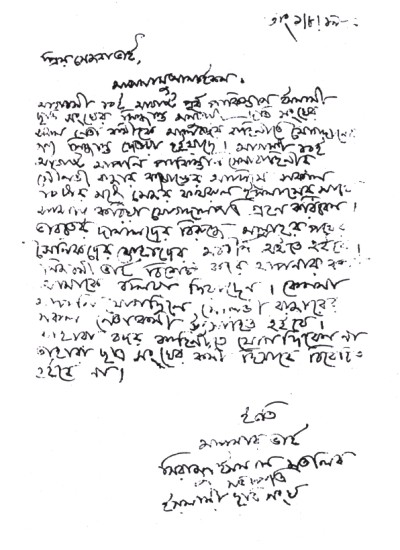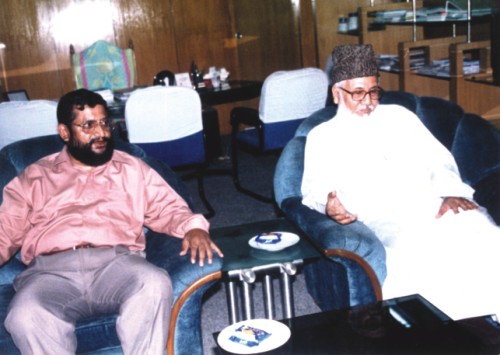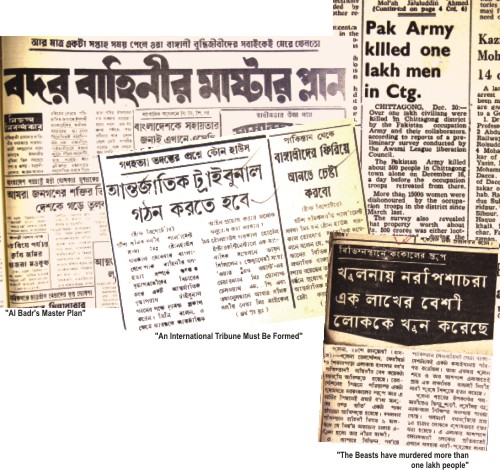Al Badr's Legacy by Ershad Kamol
A former activist of Islami Chhatra Shangha, the student wing of Jamaat e Islami reveals how the student front's members were recruited to form the infamous Al Badr forces to carry out genocide.
Ershad Kamol
In August 1971 Al Badr was formed to collaborate with the Pakistani Army in operations
 Mezbahur Rahman Chowdhury |
against the freedom fighters, to collect information, to make list of the intellectuals to be assassinated and to execute the killing operations. During the transformation of Islami Chhatra Shangha to a militia group like Al Badr the then President of Islami Chattra Shangha Moulana Matiur Rahman Nizami, current Jamaat Amir, ordered all of the activists of Islami Chatra Shangha to join the Al Badr militia. As the Supreme Commander, Nizami ordered Al Badr recruits to take military training under the Pakistani Army. His deputy was Ali Ahsan Muhammad Mujahid, the current secretary general of Jamaat.
Mezbahur Rahman Chowdhury, now chairman of Islami Oikyo Jote, was one of many Islami Chhatra Shangha activists who received the order for joining Al Badr. In 1971 Chowdhury was a Rafiq (new member) of Chhatra Shangha. He was also a member of Pakistan Shaheen Fouz, a cultural wing of Jamaat.
Earlier at a press conference he disclosed the names of 15 Pakistani collaborators against whom he claims to have enough documents to prove them as war criminals. The names of the 15 persons disclosed by Chowdhury at the press conference are-- Matiur Rahman Nizami, Ali Ahsan Muhammad Mojahid, Mir Kasem Ali, late Muhammad Younus, Muhammad Kamaruzzaman, Ashraf Hossain, ASM Ruhul Kuddus, late Sardar Abdus Salam, Abdul Hai Faruki, Abul Zaher Muhammad Abu Naser, Chowdhury Mainuddin, Ayub Miah, Barrister Abdur Razzaq, Chowdhury Fariduddin and M Shamsul Haque.
 The caption reads: Yesterday, Monday, training of a group of Razakars was completed. They are seen shooting at targets on the last day of training. |
In conversation with The Star Chowdhury unveils a few facts of the Al Badr militants during the Liberation War as well as their post war activities. Excerpts:
The Star (TS): How did you get to know about the recruitment process of Al Badr?
Mezbahur Rahman Chowdhury (MRC): In August 1971 I got a letter from Sirajul Islam Matlib, president of Moulvibazar Islami Chhtra Shangha, that read that Matiur Rahman Nizami as the President of Islami Chhatra Shangha had ordered all the activists of the organisation to join Al Badr and to report at the nearest Pakistani Army camp for militia training to fight against Indian collaborators (freedom fighters). Those who would not follow the order would not be considered activists of Islami Chhatra Shagha. Sirajul Islam Matlib also added that Nizami especially wanted me to join in Al Badr so that other activists of Moulvibazar were also encouraged.
When I showed the letter to my father, who was a Muslim League leader, he discouraged me to join and sent me to Wales for higher education. But, I returned home in November because my mother was seriously ill. From then on till the Liberation on December 16, I closely watched the activities of Al Badr militias many of whom are now leading leaders, businessmen and bureaucrats of the country.
TS: What was Jamaat Aamir Moulana Maatiur Rahman Nizami's role as the leader of Al Badr?
MRC: As the Supreme Commander of Al Badr he led the militia troupe from historic Hosni Dalan. He organised the militias and used to co-ordinate operations while his deputy the current Jamaat Secretary General Ali Ahsan Muhammad Mujahid made the list of 245 intellectuals to be killed and was successful in killing over 30. Janomat, a UK based newspaper published this list later after the Independence of Bangladesh. Moreover, I've documents that Mujahid was directly involved with killings of some Shaheeds. ASM Ruhul Kuddus was the deputy chief of Al Badr Dhaka. He and Chowdhury Mainudiin (who now lives in England) executed orders to kill the intellectuals in 1971.

A letter to Mezbahur Chowdhury from the president of Islami Chhatra Shangha urging all members to join the Al Badr or face expulsion.
TS: What happened if members of Chhatra Shangha did not join the Al Badr?
MRC: Not only the freedom fighters and intellectuals, the Al Badr militia brutally killed the Chhatra Shangha activists also who did not join the militia or had different opinions regarding forming a militia group under the banner of an Islamic student organisation.
Nakib bhai, a senior Chhatra Shangha activist who later became the Editor of Kishore Kafela magazine, informed me that a few Chhatra Shangha activists gathered at the resident of Jamaat leader Moulana Abdur Rahim at Mahakhali to discuss the transformation of Chhatra Shangha into a militia group, since they opposed this step. Soon after the meeting when three activists hired a three-wheeler, a group of militants led by Sardar Abdus Salam stopped them and burnt their three colleagues in the three-wheeler. Nakib bhai witnessed the incident and claims to have reported it to Nizami at Al Badr headquarters in Hosni Dalan. On the following day The Daily Sangram published the news that a group of Indian collaborators burnt brutally three innocent Islami Chhatra Shangha activists in Mahakhali. This incident created such an outrage in Nakib bhai's mind towards Nizami that he has promised me that he will testify the incident in the court, when a special tribunal is initiated.
TS: When did you go to the UK?
MRC: After Independence I went to UK for higher education and enrolled into Buckingham College. I met many of the Jamaat leaders in the UK and in Saudi Arabia in early 1970s and watched their conspiracies against the sovereignty of Bangladesh even after its liberation. Once I was quite surprised receiving a letter from Abdur Razzaq who was in the UK then. I saw him fighting against the freedom fighters till December in Sylhet. In fact, Abdur Razzaq was an Al Badr commander and fled to India when the Joint Forces freed Sylhet. When I met him he informed me that fleeing to India he went to Nepal from where he reached Pakistan and collected a Pakistani passport subsequently went to England. He, Golam Azam, Chowdhury Mainuddin and Pakistan Jamaaat leader Miah Tofael Ahmed jointly created a fund from the Middle East and tried to organise militancy in the newly built Bangladesh.
Ali Ahsan Muhammad Mujahid disguised as an umbrella repairman travelled all over the country to re-organise the militants to assassinate the leaders of newly elected government after the Liberation. They had the plan to gather in Chittagong and to drive operations inside the country from the Arakan state (of Myanmar). They did not have to continue such activities after the murder of Bangabandhu in 1975, since they got the chance to continue politics openly.
TS: Were you involved with them in England?
MRC: No, not at all. I was the President of UK based Muslim Students Movement. So, I'm a witness to their anti-state activities. At one stage I protested such activities, which is one of the major causes that initiated me to collect documents of their anti-state activities.
In 1974 Saudi King Faisal invited me and a few other student leaders as state guests in his Al Hamra Palace to form an organisation parallel to Youngmen's Christian Association (YCA). In the palace I found Golam Azam labelling Bangabandhu as an enemy of Islam. Azam appealed to the King to give him (Golam Azam) fund to rebuild the mosques, to distribute Holy Qurans and to compensate the families of 'Shaheed' (collaborators killed by the freedom fighters). I instantly protested his speech, which made Golam Azam and others angry with me.
We took funds from the Middle East and formed Young Muslim Organisation in the UK, which is a non-political organisation. Since then I have had no connections with any Jamaat leader.
TS: Then how did you become a part of the four party alliance?
MRC: I was not in the country when Amini came to the agreement to join Four-party Alliance. Soon after that I expelled Amini, who, in his turn, had expelled me. In fact, the anti-state activities of the Jamaat leadership motivated me to take such a step.
TS: You claim to have documents to prove that certain persons are war criminals…
MRC: I have preserved the collected statements of many witnesses against the war criminals in 1971. Many of these eyewitnesses are former Islami Chhatra Shangha activists in 1971, who refused to join the Al Badr.
TS: Why don't you file cases against them?
MRC: Look, it's not so easy to file a case. As per the commitment to the people it's the duty of current government to create a special tribunal for the trial of ware criminals I'll provide all the documents. There are many eye witnesses of the brutal actions of Al Bad'r leaders who will testify in the court.

Even though Matiur Rahman Nizami has told The Star "I did not know Mezbahur during 1971 still I don't know him personally", the photo shows Nizami with Mezbahur Rahman Chowdhury in the former's office at the Ministry of Industry The meeting, mediated by the Bangladesh Nationalist Party, was called in August 2004 by Nizami to bridge the gap between Jamaat-e-Islami and Islami Oikyo Jote. Mezbahur says he stormed out of the room after calling Jamaat leaders war criminals.
The Star contacted the Jamaat leaders accused by Mezbahur Rahman Chowdhury for their comments.
Jamaat Amir Moulana Motiur Rahman Chowdhury told The Star, "I did not know Mezbahur during 1971 still I don't know him personally. I've no comment against the allegation of such person's politically motivated statements."
Denying Chowdhury's claim, Jamaat Secretary General Ali Ahsan Muhammad Mujahid says, "Mezbahur Rahman Chowdhury himself is a 'tout'. Why don't you people dig out facts about him? I've no comments." About his role during the Liberation War of Bangladesh, Mujahid only says, "I was a student Dhaka University at that time and I had no connection with any other activities." Asked about his role immediately after the Independence he says, "I'm not interested in making any comment."


"We want Justice for the most heinous crimes in human history"
__._,_.___

